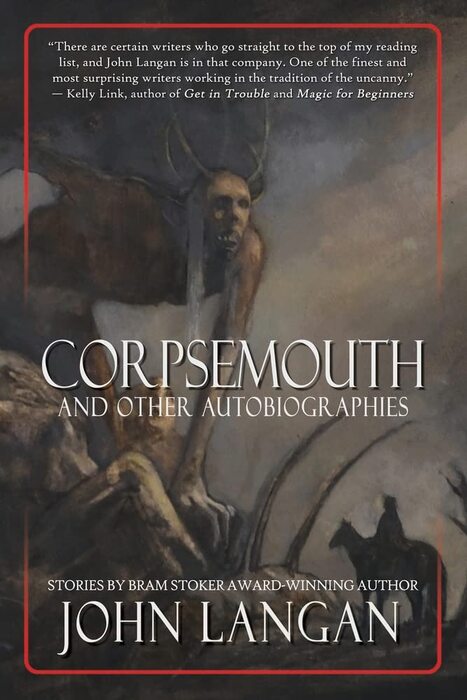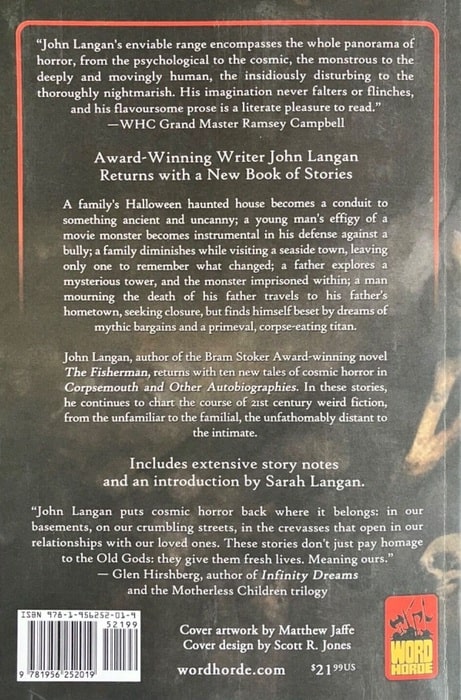Creeping Dread and Strange Melancholy: Corpsemouth and Other Autobiographies by John Langan
 |
 |
Corpsemouth and Other Autobiographies (Word Horde, July 5, 2022). Cover by Matthew Jaffe
I consume a lot of literature from a lot of genres: everything from the vibrant, mystical fantasies of Tolkien to the grim blood-and-thunder of McCarthy, and more besides. But it is with horror fiction that I find myself at both my pickiest and my most ravenous. The horror I enjoy, I love. The horror I do not enjoy, I hardly stomach. So, when I find a horror author I consistently enjoy, I try to read their works in the manner a man stranded upon a lee shore might parcel out his last bits of hardtack and beef: a piece at a time, savoring each moment, drawing it out as long as possible.
John Langan’s work does not afford me that parsimony. A veteran of horror and other speculative genres since the publication of his first story, “On Skua Island,” in The Magazine of Fantasy and Science Fiction in 2001, I devour his words wherever and whenever I find them. His latest collection, Corpsemouth and Other Autobiographies continued this long tradition of literary gluttony.
Published by Word Horde Press and released on July 5, 2022 with some beautiful cover art by Matthew Jaffe, Corpsemouth is Langan’s fifth collection. Say one thing for John Langan, say he enjoys a themed collection, and in that respect, Corpsemouth bucks no trends. As the subtitle implies, the stories here all contain a strong element of autobiography.
Official Blurb
A family’s Halloween haunted house becomes a conduit to something ancient and uncanny; a young man’s effigy of a movie monster becomes instrumental in his defense against a bully; a family diminishes while visiting a seaside town, leaving only one to remember what changed; a father explores a mysterious tower, and the monster imprisoned within; a man mourning the death of his father travels to his father’s hometown, seeking closure, but finds himself beset by dreams of mythic bargains and a primeval, corpse-eating titan.
John Langan, author of the Bram Stoker Award-winning novel The Fisherman, returns with ten new tales of cosmic horror in Corpsemouth and Other Autobiographies. In these stories, he continues to chart the course of 21st century weird fiction, from the unfamiliar to the familial, the unfathomably distant to the intimate.
Includes extensive story notes and an introduction by Sarah Langan.
Throughout the eleven stories collected within Corpsemouth, Langan mines certain recurrent elements — everything from the town Wiltwyck to his family’s Scottish heritage — to great effect. This autobiographical imperative has followed Langan’s work since “On Skua Island,” and perhaps it is responsible for the realism flavoring much of his oeuvre. His characters, whether they be the young boy of “The Open Mouth of Charybdis,” the ragged father of “Shadow and Thirst,” or the aged librarian of “The Supplement,” live and breathe within their allotted pages. Their mannerisms, their experiences, their inner rationales and outward actions, however disparate, never betray themselves as artifice. I was never left thinking a character moved purely by purpose of plot, but rather understood them each as motivated by very recognizable, very human vices (and, occasionally, virtues).
It is this facility for grounded human characters that elevates the horror of Langan’s stories, I think. His protagonists (who are not always good, or admirable) and his antagonists (who, while seldom more ethical than his protagonists, are also seldom less understandable) center the stories within the familiar, sometimes even the mundane. Thus when the fantastic invades their lives, its effect (and its horror) are heightened. In that manner, Langan succeeds in one of the very hardest tasks of the speculative author in general and the horror author in particular: he makes the fantastical elements of his stories feel truly alien, and truly alive.
The sixth story in the collection, “Anchor,” showcases Langan’s unique blend of the autobiographical, the fantastical, and the familiar at its best. Told in the third-person (a rarity for the collection: eight of its eleven tales feature first-person narrators), it recasts John Langan himself as a poet, alongside his great friend and fellow horror luminary Laird Barron, with the narrator being not-Langan’s son, a professional fisherman. At its core, “Anchor” is a story about a son’s sometimes-ambiguous relationship to his father, his father’s best friend, their shared art, and the sacrifices made along the way (yes, that’s a lot of core, and yes, the story is long).
Langan balances the humanity of these relationships against a series of confrontations with a manticore and a massive, flaming bear, all of which includes a young Not-Laird Barron stealing the mead of poetry from a cave in the Pacific Northwest. Much of this is told to us, in classic Langan fashion, through a series of dreams and frame narratives. Along the way, we’re treated to some touching ruminations on what authors must sacrifice for their art, on the nature of family, and the duty of friendship. And also, fittingly enough, we are granted some very fun poetic epigraphs. Witness, for example, the story’s opening lines, ostensibly excerpted from the poem “Odin Foresees Ragnarok” by Langan’s alter-ego, James Ogin:
Fire and ruin march on heaven. Surtur
Brandishes his sword. Loki and his awful
Brood come for revenge. Who stands with me now
Stands in my doom.
Words worthy of a saga! Or, at least, a drapa. That stanza sets the tone for the entirety of the story, and indeed, for much of the collection itself. Despite — or perhaps, because of — the lack of gore and other overt horrific set-dressing, “Anchor” achieves an atmosphere of creeping dread and strange melancholy, perhaps more reminiscent of Gene Wolfe than Stephen King. And its climactic image (which I shall not spoil) is something worthy of a Frazetta painting.
Other stand-outs in the collection include “Shadow and Thirst,” which is a very fun and frightening rendition of the “vampire in a castle” motif, as well as the eponymous “Corpsemouth” (an inventive and touching version of the “giant-slayer” trope) and “What is Lost, What is Given Away.” That third story is relatively short, but certainly punches above its weight. In it, a man attends a high school reunion and finds it (predictably) a morose, drab experience. However, he meets a former teacher at the reunion, and things take a turn for the weird. The teacher, who scandalized the community in years past by dating and impregnating a student, attempts to enlist the narrator in a strange, sorcerous ritual to help him reconnect with the son he lost. Far from a good man, or a justified one, the teacher’s pathos nevertheless shines through: a man who doomed himself, and others, yet pines still for his child. Langan captures a certain sordid, small-town atmosphere in this one that resonates as well.
There are no outright duds in the collection, though there were of course stories I liked less than others. The first and the last in the collection, “Kore” and “Caoineadh,” did not work quite as well for me as did the rest of them: the former due to its length (it is very short, and ends quite abruptly, though not without panache) and the latter I found perhaps a bit too dissolute in its melancholy. But these are, I think, rather minor nitpicks.
Overall, Corpsemouth is one of the strongest horror collections I’ve read in recent years, and certainly my favorite of Langan’s since 2013’s The Wide Carnivorous Sky and Other Monstrous Geographies. Fellow fans of character-driven, atmospheric horror will find a lot to love.
Graham Thomas Wilcox is a fiction author and freelance editor from the North Atlantic coast, where he lives with his fiancé and their two dogs. He’s provided reviews for Old Moon Quarterly and for the next issue of The Dark Man: Journal of Robert E Howard Studies, and has a penchant for reading horror and dark fantasy. This is his first review for Black Gate.
Thorough review. Looks right up my alley. Thanks for this!